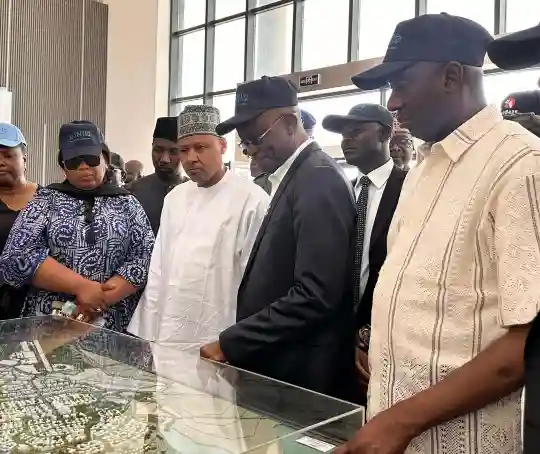The Federal Government has announced its strong commitment to collaborate with state governments and the private sector to boost agricultural investment across Nigeria.
This declaration was made by the Minister of Information and National Orientation, Mohammed Idris, during an inspection visit to Kainji Aquaculture Resources Limited’s Tilapia Fish Farm and the Hydropolis Free Trade Zone located in Amfani, Magama Local Government Area of Niger State.
The Minister, who was joined by the Minister of State for Industry, Senator John Owan Enoh; the Permanent Secretary of the Federal Ministry of Industry, Trade and Investment, Ambassador Nura Rimi; and a representative of the Managing Director of the Bank of Industry, Ugochukwu Akagaogu, praised the efforts of both private initiatives.
“Since the assumption of office by President Bola Ahmed Tinubu, he has taken deliberate steps, including the establishment of the Ministry of Marine and Blue Economy, which oversees over 800 kilometres of coastline and inland waterways suitable for aquaculture. Coupled with the newly created Ministry of Livestock Development, it is evident that the President recognises food security as key to national sovereignty,” Idris said.
The Minister described these new ministries as a visionary move, noting that they will help reduce Nigeria’s reliance on imported fish and dairy products. These efforts, he added, are part of a broader agricultural strategy aimed at encouraging local food production and empowering agro-industrial ventures.
Idris highlighted the example set by Kainji Aquaculture Resources Limited, which focuses on the hatching and rearing of Tilapia — one of the most consumed fish in Nigeria. The country currently imports a large portion of its fish, leading to huge expenses in foreign exchange.
“We have been informed that current production stands at 1,000 metric tonnes, with plans to double this to 2,000 metric tonnes by the end of the year, and to scale up to 5,000 metric tonnes within four years,” the Minister said, underlining the company’s ambitious growth plan and its potential to create direct and indirect employment.
He further praised President Tinubu’s recent commitment, reiterated during a visit to Brazil, to dismantle bureaucratic bottlenecks that have historically hindered agricultural development in Nigeria.
Speaking on the Hydropolis Free Trade Zone project, the Minister commended its scale and investment potential. He encouraged local and foreign investors to tap into the infrastructure being developed, which he said is critical for advancing Nigeria’s industrial base.
Senator John Owan Enoh, the Minister of State for Industry, also addressed stakeholders during the visit. He noted that the success of these private initiatives is closely aligned with the goals of President Tinubu’s Renewed Hope Agenda.
“A lot of incredible effort has been put by the managements of the Kainji Aquaculture Resources Limited as well as the Hydropolis Free Trade Zone and I think government has to be commended first, for finding it proper to grant the licenses for the Free Trade Zone,” Enoh stated. “The only way we can achieve Mr. President’s objectives and goals in terms of industrialization, is with the effort of private investors.”
The Minister emphasized the importance of supporting local production and processing to reduce Nigeria’s import bills and strengthen the economy. He also pointed to the role of the Bank of Industry in offering financing solutions that can support such long-term agro-industrial investments.
The Hydropolis Free Trade Zone is one of Nigeria’s most ambitious industrial projects. According to its Managing Director, Dr. Abdulmalik Ndagi, the Zone is designed to offer a full ecosystem for industries, residents, and commercial players.
He said the ongoing developments include two power substations, recreational areas around the lake, a golf course, polo field, racetrack, airport, train station, university, world-class hospitals, and other amenities to attract long-term investment.
Dr. Ndagi revealed that over ₦30 billion has already been invested in the Free Trade Zone, with expectations of further expansion. He appealed to the Bank of Industry for a ₦10 billion intervention fund to help fast-track the next phase of development.
Meanwhile, the Managing Director of Kainji Aquaculture Resources Limited, Mr. Sa’adu Baloni, also reaffirmed the company’s mission to improve the socio-economic status of both its host community and Nigeria at large through fish farming.
“We are committed to enhancing the social and economic well-being of the host community and Nigeria,” Baloni said. “We have made substantial investment in this fish farm and look forward to the support of the Bank of Industry to scale up production.”
This federal endorsement of agricultural and industrial innovation is being seen by analysts as a significant step in ensuring food security, improving local production capacity, and creating sustainable jobs for Nigerian youth.
The government’s strategic backing of agro-business and free trade infrastructure is expected to increase investor confidence, stimulate economic growth, and reduce reliance on imports.
These developments also align with high-impact sectors like agritech, aquaculture business, investment in industrial zones, and agricultural financing, all of which remain vital in reducing unemployment and conserving foreign reserves in Nigeria.
In other news, NCPWD has distributed farming tools to empower Persons with Disabilities.

